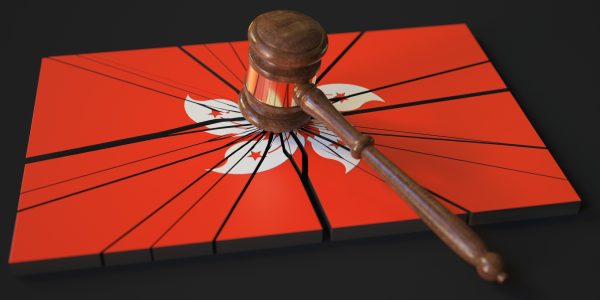Weaponizing laws and courts to imprison opposition leaders is a common strategy for authoritarian and hybrid regimes around the world, such as Russia, Belarus, Myanmar, Singapore, and China. The legal system is used as a tool to eliminate forces of political opposition, prevent mass mobilization against the rulers, and create a chilling effect in society. For some regimes, using independent courts that enjoy a limited extent of autonomy to punish opposition figures could even enhance the legitimacy and justification of legal repression.
Hong Kong is no exception to such autocratic practices.
On February 6, Hong Kong’s court will open the trial of 47 pro-democracy and opposition leaders. The authorities have charged them with alleged conspiracy to commit subversion by engaging in citywide voting exercise, known as the opposition camp’s primaries, two-and-a-half years ago.
For decades, Hong Kong’s opposition camp has gained more than 55 percent of votes in legislative elections. Now the leaders of a political movement that enjoyed popular mandates have to face a criminal charge that could give a maximum sentence of life in jail.
Beijing imposed the offense of subversion under the National Security Law (NSL) in mid-2020. Soon after the implementation of the NSL, more than 600,000 Hong Kong residents cast their ballots in civil, albeit unofficial, voting, to select candidates to run for the upcoming Legislative Council elections. As it turned out, the Legislative Council elections originally planned for 2020 were postponed, whereas the Chinese authorities condemned the voting as subversive.
On January 6, 2021, 55 individuals, including organizers of and participants in the opposition primaries, were arrested by the national security police in Hong Kong. On February 28 of the same year, 47 of the arrestees were charged with conspiracy to subversion. The remaining arrestees remained under police bail, and their passports were confiscated. Since then, most of the charged individuals have been denied bail by the court, leaving them undergoing pre-trial detention for more than 22 months.
For the Chinese authorities, the offense of subversion has been a common charge against lawyers and human rights defenders in the mainland, such as Qin Yongmin, Wang Quanzhang, and Taiwanese activist Lee Ming-che. Although these were peaceful activists – they have not been accused of engaging in any violent acts to subvert the state – they were sentenced to jail and deprived of their political rights for years.
Similarly, the offense of subversion in Hong Kong’s NSL includes even non-violent activities. The 47 charged individuals were only involved in peaceful political participation with their political platforms and advocacy, which called for vetting the government budget and realizing universal suffrage.
Hong Kong operates a different legal system from mainland China, the common law system. One of the key differences is that Hong Kong has a constitutional obligation to apply the International Covenant on Civil and Political Rights (ICCPR) under the Basic Law. It means that international human rights protections must be granted in Hong Kong, including the rights to a fair trial, free speech, and free peaceful assembly. Even the NSL recognized the applicability of the ICCPR in Hong Kong. Before the NSL, local courts also took the lead in incorporating the ICCPR rights into their jurisprudence to demonstrate their commitment to the constitutional order of Hong Kong.
That said, Hong Kong’s NSL creates several constraints that would inevitably affect the right to a fair trial and due process of this case. Apart from the lengthy pre-trial detention of most of the defendants, the case is tried by three judges designated by the chief executive of Hong Kong. The jury bench is removed upon the order of the secretary for justice. In the absence of a jury and with executive-picked judges, the public cannot use their common sense to check and balance the prosecutorial and judicial narratives of this politically controversial case. In short, the authorities could easily dominate the narrative of alleged subversive activities in the courtroom under all the executive-led intervention in a national security trial.
In addition, following the NSL, local courts shall obtain a binding certificate from the chief executive to certify whether an act involves national security or whether the relevant evidence involves state secrets when such questions arise. The recent NSL interpretation by China’s National People’s Congress Standing Committee further affirmed that Hong Kong’s national security committee could perform its duty under the NSL to make judgment and decisions if the court did not obtain a certificate from the chief executive.
Hypothetically, if the court asked the chief executive to certify whether the opposition camp’s primaries and policy platforms involve national security, the court would have no other option but to follow the chief executive’s judgment. Suppose the court did not ask for a certificate from the chief executive, in that case, the national security committee could also act as an ultimate authority in this matter.
As I have commented before, the NSL and Beijing’s interpretation of the NSL enable a “dual state” to operate in Hong Kong’s legal system. There is now an “exceptional criminal justice system” for national security crimes, in which the executive authorities can, in theory, overturn a court’s decision. When the Hong Kong Bar Association asked the local authorities to use their power with great caution and restraint, it only meant that the city’s rule of law and judicial independence have become more dependent on the arbitrary powers now enjoyed by the executive.
Indeed, as early as last summer, the United Nations Human Rights Committee formally called for the repeal of the NSL and asked the Hong Kong government to refrain from using it, as well as calling for Hong Kong to discontinue all cases against journalists and individuals charged for exercising their right to freedom of expression. Yet, instead of following the U.N. committee’s recommendations, the Hong Kong government chose to criticize the expert-based committee as “unfair” and “unsubstantiated.”
Only 16 of the 47 defendants decided to plead not guilty, meaning they would seek to defend themselves before the court in the next three months. Although the decision to enter a guilty plea lies completely with the defendants themselves, the structural issues above that incentivize a guilty plea – particularly the lengthy pre-trial detention and the removal of a jury – should not be overlooked.
Some may argue that Hong Kong is still different from the autocratic regimes named above, because it does not have a kangaroo court. Yet, the old narrative of Hong Kong’s judicial independence and the rule of law is no longer persuasive in light of this political trial. While it is true that we must wait and see the development and result of the trial, the fact is that provisions of the NSL have already circumcised the city’s independent courts in many ways. They empower the Hong Kong government to suppress opposition leaders and followers conveniently, following the footsteps of their peer authoritarian regimes today.





















Discussion about this post